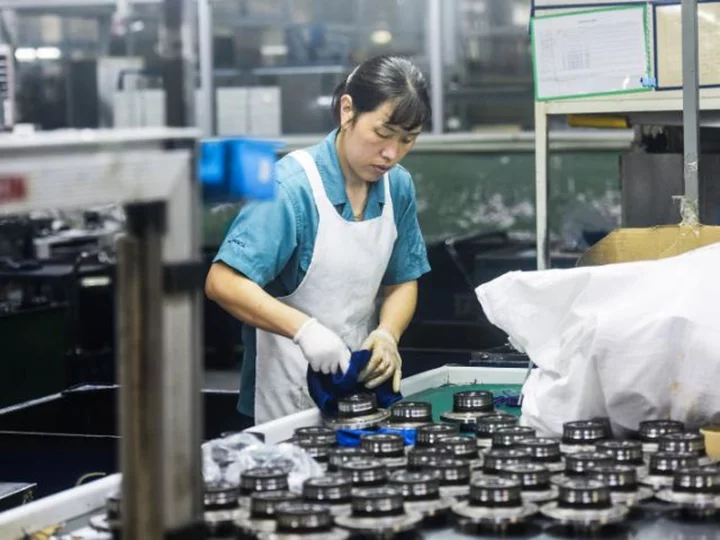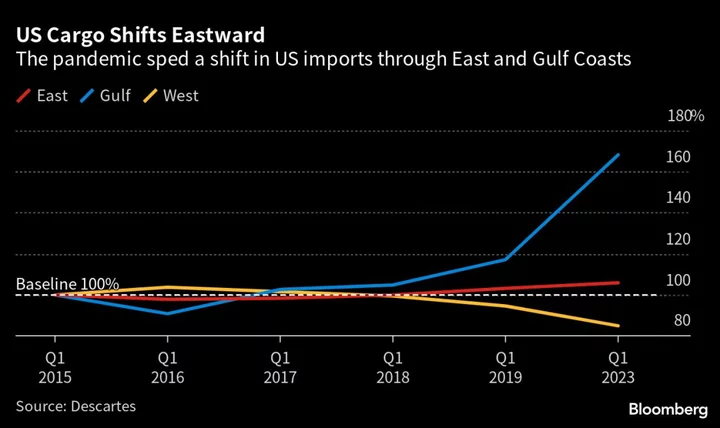China's factory sector has contracted for a fourth straight month, while a gauge of its services sector has slipped to a seven month low, raising pressure on policymakers to deliver more stimulus to reinvigorate a stumbling economy as global and domestic demand softens.
The official manufacturing Purchasing Managers' Index (PMI), which measures activity level in the manufacturing sector, came in at 49.3 in July, according to data released by the National Bureau of Statistics on Monday.
That result was slightly up compared with 49 in June but the index has nonetheless contracted each month since April. A PMI reading above 50 indicates expansion, while anything below that level shows contraction.
The official non-manufacturing PMI, which looks at activities in the services and construction industries, fell to 51.5 from 53.2 in June.
That is the lowest rate since December, when the non-manufacturing PMI hit the weakest level since February 2020 at the start of the coronavirus pandemic.
By the end of last year, Covid infections were sweeping through China after Beijing abruptly ended nearly three years of draconian pandemic restrictions that initially kept the virus at bay while hammering local businesses and isolating the world's second largest economy.
The government's PMI survey mainly covers larger businesses and state-owned firms.
"China's official PMI data provides little encouragement that the economy is turning the corner," said Robert Carnell, regional head of research for Asia-Pacific at ING Group.
"We can only put this down to continued hope that the government will pull something out of the bag that will re-invigorate the economy."
Monday's manufacturing and service sector figures are just latest data points that show how China's economy is struggling.
China's GDP grew just 0.8% in the second quarter of this year, down significantly from the still tepid 2.2% growth it registered in the first three months of 2023. Consumer spending has weakened, the housing market has slumped, and the youth unemployment rate has soared to a fresh record of 21.3%.
Much like many other parts of the world this summer, extreme weather has also posed a threat to economic growth.
In recent weeks parts of China have been hit by a double whammy of heat waves and torrential rain, threatening to strain power supplies and disrupt factory production as well as crop yields.
New measures to boost consumption
The frail data has prompted Beijing to increase efforts to shore up growth.
Five central agencies, including the National Development and Reform Commission (NDRC) and the Ministry of Industry and Information Technology (MIIT), will announce new measures later on Monday to boost consumption, according to a statement from the State Council Information Office.
On Friday, China unveiled a two-year plan to boost so-called "light industry," which includes consumer packaged goods, consumer durables, sports and leisure equipment, and light industrial machinery, according to a statement jointly published by the NDRC, MIIT, and the Ministry of Commerce.
The goal is to speed up the industry's growth to 4% for 2023 and 2024, after it only registered a 0.4% expansion in the first half of the year, the statement said.
In the past weeks, authorities have tried to appear more proactive in supporting the private sector, a key growth driver that has been hammered by Covid restrictions as well as a sweeping regulatory crackdown under Chinese leader Xi Jinping that targeted sectors from technology to private education.
However, these micro measures have not translated into the sort of "sizable fiscal policy stimulus" many have expected, Carnell said.
"Looking forward, policy support is needed to prevent China's economy from slipping into a recession," said analysts from Capital Economics.
"Unless concrete support is rolled out soon, the recent downturn in demand risks becoming self-reinforcing."








